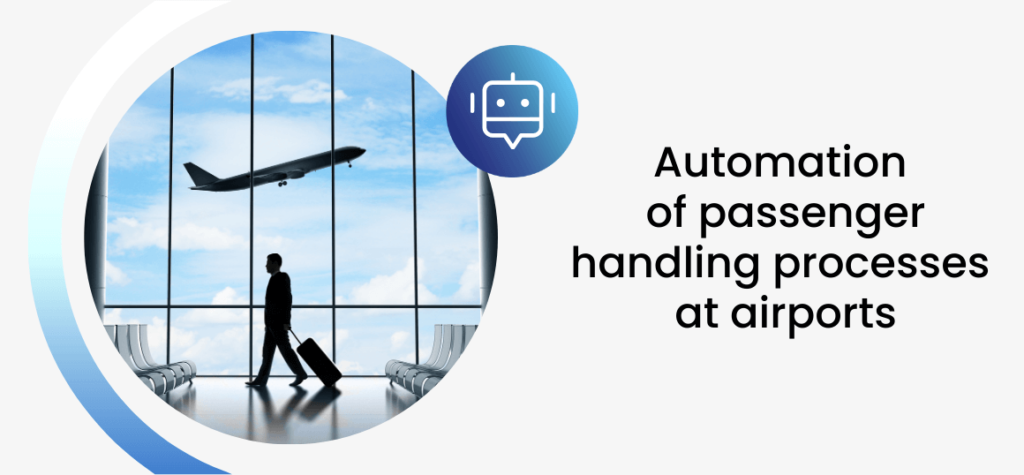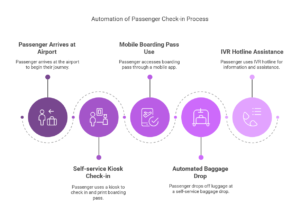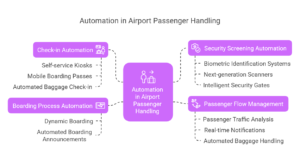Automation of passenger handling processes at airports

Automation of passenger handling processes at airports – the key to efficiency and travel comfort
Modern airports handle thousands of passengers daily, with the number of travelers increasing each year. To meet this challenge, airports worldwide are implementing advanced technologies to streamline passenger handling and enhance travel comfort. Process automation helps reduce queues, improve security, and lower operational costs. This article explores the key areas where automation is transforming airport operations and the benefits it brings to both passengers and airport management.
Automation of passenger check-in
One of the first stages of air travel is check-in, which can often be time-consuming and stressful. Automating this process simplifies and accelerates the experience for passengers.
Self-service kiosks
Many airlines and airports have introduced self-service kiosks that allow passengers to check in, select their seats, and print their boarding passes independently. This reduces the load on traditional check-in counters and shortens waiting times.
Mobile boarding passes and airport apps
The development of mobile technology has led many passengers to use digital boarding passes available through airline and airport apps. This solution minimizes the need for printed documents and significantly facilitates the work of ground handling agents, enabling travelers to move quickly through the check-in process.
Automated baggage check-in (self-bag drop)
Self-bag drop systems allow passengers to check in their luggage independently without interacting with airport staff. After scanning their boarding pass, passengers place their baggage on the conveyor belt, where the system automatically weighs it, detects any excess baggage fees, prints a baggage tag, and directs it to the appropriate handling area. This solution significantly reduces queues at traditional check-in counters.
Automated inquiry handling and IVR hotlines
The implementation of self-service systems can be supported by IVR (Interactive Voice Response) hotlines, which provide automated assistance for passenger inquiries. Through intelligent voice menus, travelers can quickly access travel-related information, flight status updates, check-in procedures, and baggage regulations—without requiring direct assistance from airport staff.

Automation of security screening
Security is one of the most critical aspects of air travel. To uphold common aviation security standards, member states are committed to implementing and enforcing appropriate regulations and safety measures in accordance with international standards. Automating security screenings helps enhance both efficiency and speed.
Biometric identification systems
Modern airports are increasingly implementing facial recognition technology to verify passenger identities. Cameras scan a traveler’s face and compare it with passport or ID data, eliminating the need for manual document checks. This system is already in use at major airports such as Heathrow in London and various airports in the United States.
Next-generation scanners
Modern carry-on baggage scanners eliminate the need for passengers to remove electronics and liquids from their bags, significantly speeding up security checks. These scanners, based on computed tomography (CT) technology, provide higher image quality and more accurate content analysis.
Intelligent security gates
Automated access control gates allow passengers to pass through security checkpoints quickly, eliminating the need for manual ticket verification by security staff. This solution reduces bottlenecks and improves passenger flow efficiency.
Automation of the boarding process
The final stage before boarding an aircraft often involves long waiting times in queues. Automating this process enhances efficiency and convenience for travelers.
Dynamic boarding
Advanced algorithms analyze the number of passengers and their seating distribution in the aircraft to optimize the boarding sequence. These systems help reduce congestion in waiting areas and expedite seat allocation, ensuring a smoother boarding experience.
Automated boarding announcements
To prevent passengers from missing their flights, airports can implement automated voice announcement systems. These terminal-wide announcements inform travelers when boarding begins for specific flights and provide reminders about boarding procedures.
Next-generation scanners
Modern carry-on baggage scanners eliminate the need for passengers to remove electronics and liquids from their bags, significantly speeding up security checks. These scanners, based on computed tomography (CT) technology, provide higher image quality and more accurate content analysis.
Intelligent security gates
Automated access control gates allow passengers to pass through security checkpoints quickly, eliminating the need for manual ticket verification by security staff. This solution reduces bottlenecks and improves passenger flow efficiency.
Automation of the boarding process
The final stage before boarding an aircraft often involves long waiting times in queues. Automating this process enhances efficiency and convenience for travelers.
Dynamic boarding
Advanced algorithms analyze the number of passengers and their seating distribution in the aircraft to optimize the boarding sequence. These systems help reduce congestion in waiting areas and expedite seat allocation, ensuring a smoother boarding experience.
Automated boarding announcements
To prevent passengers from missing their flights, airports can implement automated voice announcement systems. These terminal-wide announcements inform travelers when boarding begins for specific flights and provide reminders about boarding procedures.

Intelligent passenger flow management
Maritime and air transport industries are increasingly leveraging Artificial Intelligence (AI) and the Internet of Things (IoT) to enhance passenger handling. These technologies enable airports to monitor and optimize traveler flow in real time.
Passenger traffic analysis
International legal and regulatory frameworks in civil aviation impose high standards on airlines, not only in terms of safety but also in operational efficiency. Passenger flow monitoring systems use data from cameras, sensors, and mobile applications to track movement within terminals. This allows for dynamic traffic management, such as opening additional security checkpoints during peak hours or detecting suspicious individuals or behaviors.
Passenger notifications and guidance
Advanced systems can send real-time notifications to passengers via mobile applications, informing them of estimated wait times at security checks, suggesting the best routes through the terminal, or reminding them of upcoming boarding times.
Automation of baggage handling
Efficient baggage management is a crucial component of airport operations. Automated baggage sorting systems utilize advanced algorithms and robotics to quickly identify and direct luggage to the correct destination.
The logistics and transport processes at airports are becoming increasingly optimized through the implementation of RFID (Radio Frequency Identification) technology, enabling precise real-time baggage tracking. This minimizes the risk of lost luggage and streamlines the baggage claim process.
Some airports, such as The Hague, are also introducing autonomous baggage carts that transport luggage from check-in points to the loading zone, reducing manual labor requirements and increasing operational efficiency.
SMS notifications on baggage status
Passengers often feel anxious about baggage retrieval. With SMS notification services, they can receive real-time updates on their luggage status, such as whether it has been unloaded and where to pick it up. This solution reduces waiting time at baggage claim areas and enhances overall travel comfort.
EasyCall: Modern communication for your business
The future of air travel belongs to intelligent systems that operate seamlessly, automatically, and reliably. Are we ready for the airports of the future, where long queues, paper documents, and unnecessary stress are eliminated? What once seemed like a distant vision is now becoming the standard for modern passenger service.
If you are looking for innovative and efficient communication solutions, EasyCall is the perfect choice for your business! We offer intelligent IVR systems, SMS notifications, and automated voicebots that streamline customer service and help you save time and resources. Join thousands of companies that already trust us and discover how easy it is to automate communication processes. Contact us today and see how we can help your business operate more efficiently!
